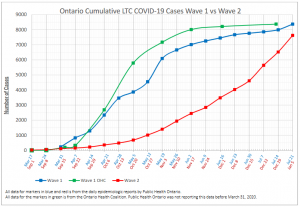RELEASE: COVID-19 Outbreaks in Health Care Settings Threaten to Topple Devastating Records Set in the First Wave
Posted: January 11, 2021
(January 11, 2021)
The second wave of COVID-19 in long-term care has sharply escalated, today surpassing the peak of the first wave, and is spreading further across the province than the first wave. The Ontario Health Coalition released its latest tracking report covering the large outbreaks in health care settings, including long-term care, hospitals and retirement homes. The analysis and full list of large outbreaks is here: https://www.ontariohealthcoalition.ca/index.php/report-tracking-the-spread-of-covid-19-rise-in-large-covid-19-outbreaks-in-health-settings/
In long-term care, at the end peak of the first wave in late June, the cumulative number of residents and staff infected with COVID-19 reached 7,671 according to Ontario Public Health’s data tracking. At the beginning of September there were only 24 active cases of COVID-19 in Ontario’s long-term care homes. By mid-December the escalation had reached a thousand cases every week, and we are now, as of January 8, 2021 at 7,970 cumulative cases in the second wave. Ontario has now surpassed the devastation that Ontario’s long-term care homes suffered during the first wave without any indication that the curve is close to flattening. In fact, the virus is spreading faster.
Across Ontario’s health care settings, there has been a sharp increase in the number of outbreaks as well as total numbers of people infected. There are currently 451 current active health care outbreaks (long-term care, retirement homes and hospitals), and 119 large currently active outbreaks in health care settings (as defined by >10 patients/residents and staff infected).
- Total current long-term care outbreaks: 231, of which 81 are large.
- Total current hospital outbreaks: 72, of which 20 from 10 hospitals are large outbreaks.
- Total current retirement home outbreaks: 148, of which 32 are large outbreaks.
Despite the Minister of Long-Term Care, Merrilee Fullerton, repeatedly trying to downplay the situation, there is no question that the outbreaks are not in control as many outbreaks have grown alarmingly and the number of people — both residents and staff affected — has rapidly increased. As of January 8, the cumulative number of cases (staff and patients/residents) in the currently active large outbreaks is 7,385. A month ago, the total number of cases in currently active large outbreaks was 3,626, a 104% increase in cases overall.
Growth in the number of active long-term care outbreaks:
- As of January 8 there are 231 active outbreaks in Ontario’s long-term care homes.
- As of December 1 there were 118 active outbreaks in Ontario’s long-term care homes.
- As of November 17 there were 100 active long-term care outbreaks.
- As of October 31 there were 76 active long-term care outbreaks.
- As of September 30 there were 42 active long-term care outbreaks.
- As of September 1 there were 18 active long-term care outbreaks
Growth in the size of the active long-term care outbreaks:
Of the current Ontario long-term care home outbreaks (January 8)
- 81 outbreaks include 10 or more residents and staff infected;
- 41 outbreaks include 50 or more residents and staff infected;
- 19 outbreaks include 100 or more residents and staff infected;
- 11 outbreaks include 150 or more residents and staff infected, and;
- 7 outbreaks include 200 or more residents and staff infected, and;
- 3 outbreaks include 250 or more residents and staff infected.
Clearly the measures that have been taken are not adequate. Virtually every day we hear from staff and families about inadequate PPE, improper cohorting and infection control practices, lack of accountability for the home operators who are not ensuring adequate safety measures, and crisis-level staffing shortages. The death toll will surpass 3,000 residents, likely today. Long-term care outbreaks have spread now across the entire breadth of southern Ontario and into northern Ontario. London, Guelph, Waterloo and Durham have joined Toronto, Halton, Hamilton, Niagara, Peel, Windsor, York as hotspots and Northern Public Health Units like Thunder Bay has experience tragic outbreaks despite being untouched during the first wave. The Health Coalition has called for stronger public health measures to check the spread of the virus including more coherent effective shutdowns, full public reporting of outbreaks, better safety measures in open workplaces. In long-term care, the Coalition has called for military support for the current emergency, and as an urgent priority a massive recruitment drive to address the staffing crisis in long-term care, along with real accountability for LTC home operators and much stronger infection control measures. All long-term care home residents, staff and essential caregivers need to be vaccinated and the Coalition has made a series of recommendations to improve the ramp up of the vaccine roll-out, recognizing also the tremendous work of the vaccine teams from our local public hospitals that have done a tremendous job in very difficult circumstances.
Click here for printable version



